In a move that’s raising eyebrows across the automotive and legal worlds, Tesla has quietly settled a wrongful death lawsuit stemming from a fatal crash involving its Autopilot system. The confidential agreement, reached just weeks before the case was set to go to trial in California, marks another chapter in the growing scrutiny of Tesla’s advanced driver-assistance systems (ADAS) and their role in real-world accidents.
🚗 The Tragic Incident
The case revolved around a 2019 crash in Alameda County, California, where a Tesla Model 3 operating on Autopilot rear-ended a pickup truck on Interstate 880. The collision caused the truck to roll over, tragically killing 15-year-old Jovani Maldonado, who was a passenger returning home from a soccer game with his father.
Court documents revealed that the Tesla driver, Romeo Yalung, was traveling at 69 mph and failed to slow down despite the pickup truck signaling and merging into the lane ahead. Autopilot was engaged at the time, and neither the driver nor the system reacted in time to prevent the crash.
⚖️ Legal Fallout and Settlement
The lawsuit, Maldonado v. Tesla, was set to go to trial in Alameda County Superior Court. However, both parties requested the court to approve a confidential settlement, effectively ending the legal battle before it could reach a jury. The terms of the settlement remain undisclosed, but the timing suggests Tesla may have sought to avoid another damaging verdict following its recent courtroom loss in Florida.
In that Florida case, a jury awarded $243 million in damages to victims of a separate fatal Autopilot crash. The jury assigned 33% of the blame to Tesla, rejecting the company’s defense that drivers are solely responsible for vehicle operation—even when Autopilot is active.
🧠 Autopilot and Accountability
Tesla’s Autopilot and Full Self-Driving (FSD) systems are classified as Level 2 driver assistance technologies. This means they require constant driver supervision and are not autonomous. Despite this, critics argue that Tesla’s marketing and naming conventions—like “Full Self-Driving”—mislead consumers into overestimating the system’s capabilities.
The plaintiffs in the California case contended that Tesla was negligent in deploying Autopilot without geofencing or adequate safeguards. They also criticized the company’s failure to prevent misuse of the technology, especially in high-speed or complex driving environments.
🔍 A Pattern of Settlements
Tesla’s decision to settle this case quietly is part of a broader trend. The company has faced dozens of lawsuits related to crashes involving Autopilot and FSD. While many have been dismissed or settled out of court, the recent Florida verdict appears to have shifted the legal landscape. More cases are now heading to trial, and plaintiffs’ attorneys are emboldened by the precedent set.
The implications are significant. If courts continue to hold Tesla partially liable for Autopilot-related crashes, the company could face billions in damages. Some estimates suggest that with over 50 deaths linked to Autopilot or FSD, the potential liability could exceed $2.5 billion.
📉 Impact on Tesla’s Future
Tesla’s valuation—currently hovering around $1.4 trillion—is heavily tied to its promise of autonomous driving and robotaxi services. CEO Elon Musk has repeatedly touted FSD as a cornerstone of Tesla’s future. But legal setbacks and mounting scrutiny could slow down regulatory approval and consumer adoption.
The company’s response has been to double down on legal defenses, hiring high-profile attorneys and seeking to overturn unfavorable verdicts. Yet, the quiet settlement in the Maldonado case suggests a strategic pivot—perhaps an effort to avoid another public courtroom defeat that could further damage its reputation.
🛑 What Comes Next?
As more lawsuits make their way through the courts, Tesla’s legal strategy and product safety protocols will be under the microscope. Regulators may also step in to reassess the oversight of driver-assistance technologies, especially those marketed with terms like “Autopilot” and “Full Self-Driving.”
For consumers, the takeaway is clear: despite the futuristic branding, Tesla’s driving systems still require full attention and responsibility. The tragic death of Jovani Maldonado is a sobering reminder of the real-world consequences when technology fails—or is misunderstood.
Final Thoughts
Tesla’s quiet settlement may have closed one chapter, but the story of Autopilot’s legal and ethical reckoning is far from over. As the company continues to push the boundaries of autonomous driving, it must also confront the human cost of innovation. Transparency, accountability, and safety must take center stage if Tesla hopes to maintain public trust and fulfill its ambitious vision.
